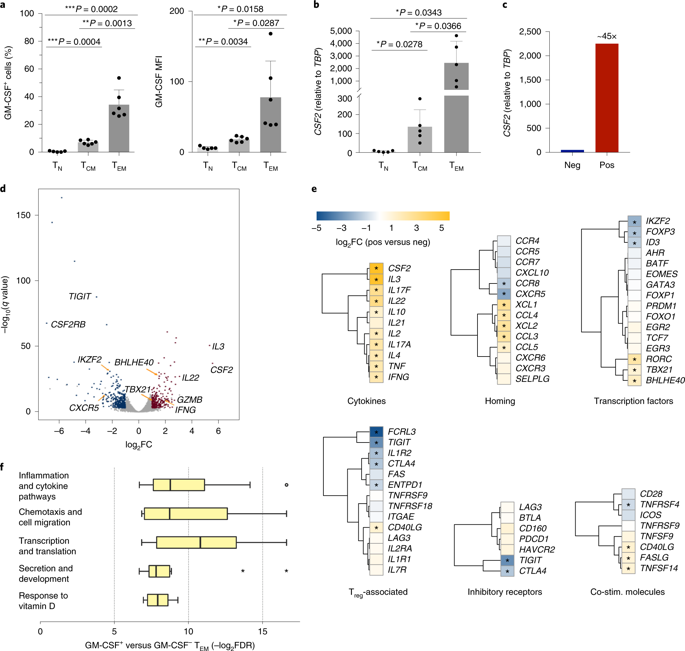当前位置:
X-MOL 学术
›
Nat. Immunol.
›
论文详情
Our official English website, www.x-mol.net, welcomes your feedback! (Note: you will need to create a separate account there.)
A molecular network regulating the proinflammatory phenotype of human memory T lymphocytes.
Nature Immunology ( IF 30.5 ) Pub Date : 2020-03-16 , DOI: 10.1038/s41590-020-0622-8 Stefan Emming 1, 2 , Niccolò Bianchi 1, 2 , Sara Polletti 3 , Chiara Balestrieri 3 , Cristina Leoni 1 , Sara Montagner 1 , Michele Chirichella 1 , Nicolas Delaleu 4, 5, 6 , Gioacchino Natoli 3, 7 , Silvia Monticelli 1
Nature Immunology ( IF 30.5 ) Pub Date : 2020-03-16 , DOI: 10.1038/s41590-020-0622-8 Stefan Emming 1, 2 , Niccolò Bianchi 1, 2 , Sara Polletti 3 , Chiara Balestrieri 3 , Cristina Leoni 1 , Sara Montagner 1 , Michele Chirichella 1 , Nicolas Delaleu 4, 5, 6 , Gioacchino Natoli 3, 7 , Silvia Monticelli 1
Affiliation

|
Understanding the mechanisms that modulate helper T lymphocyte functions is crucial to decipher normal and pathogenic immune responses in humans. To identify molecular determinants influencing the pathogenicity of T cells, we separated ex vivo-isolated primary human memory T lymphocytes on the basis of their ability to produce high levels of inflammatory cytokines. We found that the inflammatory, cytokine-producing phenotype of memory T lymphocytes was defined by a specific core gene signature and was mechanistically regulated by the constitutive activation of the NF-κB pathway and by the expression of the transcriptional repressor BHLHE40. BHLHE40 attenuated the expression of anti-inflammatory factors, including miR-146a, a negative regulator of NF-κB activation and ZC3H12D, an RNase of the Regnase-1 family able to degrade inflammatory transcripts. Our data reveal a molecular network regulating the proinflammatory phenotype of human memory T lymphocytes, with the potential to contribute to disease.
中文翻译:

调节人类记忆 T 淋巴细胞促炎表型的分子网络。
了解调节辅助 T 淋巴细胞功能的机制对于破译人类的正常和致病性免疫反应至关重要。为了确定影响 T 细胞致病性的分子决定因素,我们根据离体分离的原代人类记忆 T 淋巴细胞产生高水平炎性细胞因子的能力进行分离。我们发现记忆 T 淋巴细胞的炎症、细胞因子产生表型由特定的核心基因特征定义,并通过 NF-κB 通路的组成型激活和转录抑制因子 BHLHE40 的表达进行机械调节。BHLHE40 减弱抗炎因子的表达,包括 miR-146a、NF-κB 激活的负调节因子和 ZC3H12D,一种能够降解炎症转录物的 Regnase-1 家族的 RNase。我们的数据揭示了一个调节人类记忆 T 淋巴细胞促炎表型的分子网络,有可能导致疾病。
更新日期:2020-04-24
中文翻译:

调节人类记忆 T 淋巴细胞促炎表型的分子网络。
了解调节辅助 T 淋巴细胞功能的机制对于破译人类的正常和致病性免疫反应至关重要。为了确定影响 T 细胞致病性的分子决定因素,我们根据离体分离的原代人类记忆 T 淋巴细胞产生高水平炎性细胞因子的能力进行分离。我们发现记忆 T 淋巴细胞的炎症、细胞因子产生表型由特定的核心基因特征定义,并通过 NF-κB 通路的组成型激活和转录抑制因子 BHLHE40 的表达进行机械调节。BHLHE40 减弱抗炎因子的表达,包括 miR-146a、NF-κB 激活的负调节因子和 ZC3H12D,一种能够降解炎症转录物的 Regnase-1 家族的 RNase。我们的数据揭示了一个调节人类记忆 T 淋巴细胞促炎表型的分子网络,有可能导致疾病。


























 京公网安备 11010802027423号
京公网安备 11010802027423号